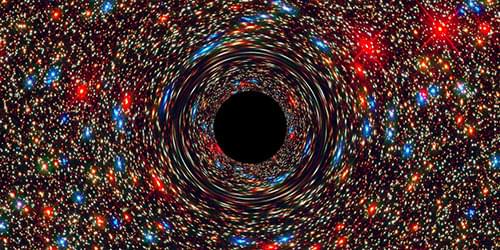The formation of a black hole from light alone is permitted by general relativity, but a new study says quantum physics rules it out.
Black holes are known to form from large concentrations of mass, such as burned-out stars. But according to general relativity, they can also form from ultra-intense light. Theorists have speculated about this idea for decades. However, calculations by a team of researchers now suggest that light-induced black holes are not possible after all because quantum-mechanical effects cause too much leakage of energy for the collapse to proceed [1].
The extreme density of mass produced by a collapsed star can curve spacetime so severely that no light entering the region can escape. The formation of a black hole from light is possible according to general relativity because mass and energy are equivalent, so the energy in an electromagnetic field can also curve spacetime [2]. Putative electromagnetic black holes have become popularly known as kugelblitze, German for “ball lightning,” following the terminology used by Princeton University physicist John Wheeler in early studies of electromagnetically generated gravitational fields in the 1950s [3].
